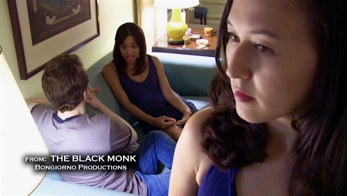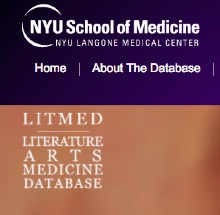
THE BLACK MONK
Reviews
Use the film in your classroom to stimulate discussions/debates about:
-
• PTSD (post-traumatic stress disorder)
-
• anxiety (which Kierkegaard described) as a “spiritual condition”
-
• psychosis • politics • poverty • inner cities
• religion and ethics • Chekhov and literary adaptations • filmmaking

Their contemporary transposition works much better than any period adaptation, and the actors give very fine performances. The filmmakers also include the deft touch of subtly incorporating the Braga serenade which is such an important element of the story’s intrinsic musicality.
The film’s exhilarating script had me thinking again of the whole principle of inversion running through the story, which makes "The Black Monk" such a challenging and stimulating work to read.”
Dr. Rosamund Bartlett
author of Chekhov: Scenes From a Life
translator of the Chekhov anthology About Love and Other Stories
including “The Black Monk”
---------------------------------------
"THE BLACK MONK is certainly not a reverentially literal adaptation of Anton Chekhov’s eponymous story or a simplistic attempt at dressing Chekhov’s narrative in contemporary garb. Rather, the film offers a thoughtful meditation on Chekhov’s inquiry into what constitutes human goodness, as well as on the limits of one man’s ability to affect universal change, in today’s world.
There are clear connections in the film to the story that inspired the filmmakers, primarily in the figure of its protagonist. As in Chekhov, the main character’s acute desire to help humanity leads to temptation and hubris. As in Chekhov, the high-strung protagonist loses contact with reality; and his own ideas of exceptionality, on being “far above the herd,” are presented to him and the audience by the phantom of the black monk. In both the story and the film, the protagonist’s hubris is closely linked to mental disease whose symptoms are meticulously recorded.
The roots of Chekhov’s main character’s demise are found in his aversion to practical, if small-scale, solutions, in favor of a global transformation dreamed up in an ivory tower. The main character’s exaggerated sense of his abilities leads to his death and to the ruin of everybody around him.
In the film, the protagonist’s fate is left uncertain. The filmmakers focus centrally on the protagonist’s hubris and on his tortured relationship with his own faith. The character’s challenge to God’s powers is what interests the filmmakers the most."
Dr. Nadya Peterson
Head of the Russian and Slavic Studies Program
Department of Classical and Oriental Studies
Hunter College and CUNY Graduate Center
---------------------------------------
“THE BLACK MONK = Highly recommended movie… is a beautifully shot, erudite, heartbreaking tale of misbegotten love….the film is... rich in themes…. The Bongiornos have taken these basic elements and flooded them with modern and not-so-modern dilemmas: families that feud over politics… unrequited attraction; youths torn between bourgeois comforts and following their artistic passions....the Bongiornos...use lush, serene backdrops–the courtyards of the new Staten Island Museum and the Chinese Scholars Garden–and vibrant tracking shots for their most revelatory scenes. There’s always a piece of Buddhist sculpture or a reservoir or swath of violets to gaze at, as the central duo, George (Jack Berenholtz) and Maggie (Emily Gardner Hall) flirt and tease and argue their way through these wondrously uninhabited establishments. (There is something undoubtedly romantic about having a whole museum or botanical garden to yourself, for a full day of intoxicating conversation, with the love of your life)….There are a lot of hot button topics discussed in “The Black Monk”–abortion, the Iraq war, urban development,corrupt politicians, race riots. But the most scintillating message the film delivers is a warning against megalomania….This is the tragic element of the picture, and the Bongiornos pull it off vividly. As George slips further into disarray, the Bongiornos retain the finest speech of Chekhov’s piece, wherein George castigates Maggie for trying to medicate him, to rein him into mediocrity. They raise some wrenching questions: to what extent should we let the ones we love obsess over their passions, and when do we need to pull them back into reality, and what furor do we risk unleashing by mollifying their intensity, however brilliant?...”
Sam Weisberg
Film Critic, Hidden Films
---------------------------------------
“THE BLACK MONK turns out to be an excellent subject for film adaptation. The filmmakers (also co-screenwriters) have managed to tap into some of Chekhov’s quirkiness and wit, and the result is quite entertaining. They have also done a great service by providing a valuable tool for teaching about mental illness.”
Dr. Guy Glass, MD, MFA
Clinical Assistant Professor
Center for Medical Humanities, Compassionate Care and Bioethics
Stony Brook School of Medicine
(posted to NYU School of Medicine LITMED)
http://medhum.med.nyu.edu/view/17533
---------------------------------------
"As if THE BLACK MONK film isn't intriguing enough, it’s also a compelling medium to build a medical school didactic around.”
Dr. Anthony Tobia, MD
Dept. of Psychiatry, Rutgers Robert Wood Johnson Medical School
---------------------------------------
“Great job relating the film to psychoses.”
“Very interesting and unique lecture...enjoyed examining illness through the lens of a film.”
Rutgers Robert Wood Johnson Medical School Students
---------------------------------------
"Fantastic! THE BLACK MONK film serves as a great tool for medical students and the larger community to gain insight in to the personhood of those with psychosis and/or mood disorders. It especially sheds light on the tension between individuals living with psychiatric disorders and those around them. As the psychiatrically ill navigate their lives, others around them may not be able to understand or accept behavior that falls beyond societal norms. The actors’ portrayal of these relationships truly captures the struggles witnessed in family and group therapy sessions, and brings to life various aspects of patients’ hardships. Definitely a must watch for individuals striving to enhance their understanding of perspectives held by those with psychiatric diagnoses."
Serra Akyar, MPH
MD Candidate, Class of 2020, Rutgers New Jersey Medical School
---------------------------------------
“THE BLACK MONK by Bongiorno Productions provided the medium for medical students to focus on story first, and then be led through a clinical reasoning exercise in Psychiatry created by Anthony Tobia, MD. This was a perfect union between medicine and the humanities. Success!"
Nancy Gross
Humanities Educator
Overlook Medical Center
Atlantic Health System
---------------------------------------
"Many words that the monk said about charity and helping others came close to my own dreams regarding the type of medicine I wish to practice. In a world heavily oriented towards economic well-being, it is nice to hear that there is more than that."
“The film did a good job of illustrating key ideas in mood/anxiety and dissociative/psychotic spectrum of disorders.”
“The media clips were medically accurate and interesting.”
3rd and 4th Year Medical School Students
---------------------------------------
"A not to be missed, very moving film that realistically demonstrates the tragic influence that common medical conditions have on everyday life.”
Dr. Lee B. Reichman, MD, MPH
Adjunct Professor of Medicine, Rutgers New Jersey Medical School
Professor of Epidemiology, Rutgers School of Public Health
Senior Advisor, NJMS Global TB Institute
---------------------------------------
“Watching the protagonist’s psychosis in THE BLACK MONK film primes medical students to listen more carefully to patients and take a better medical history. The film excels in portraying how important it is to try to understand the different dimensions that the disturbed mind can go to and helps doctors gain understanding of patients’ experiences."
Dr. Cheryl Ann Kennedy MD, DLFAPA
Associate Professor Psychiatry, Rutgers New Jersey Medical School
---------------------------------------
“THE BLACK MONK film raises questions central to the spiritual life: how we want to live our lives in a safe garden but must venture out...how we must balance faith and science as believers...and how we must negotiate the joyful consolation of our relationships with God and others with the daily bumpiness when things don't go the way we want. This film is a modern riff on an ancient struggle to live for greater ideals in a messy world."
Dr. Christopher Bellitto, Kean University History Professor
---------------------------------------
"It's no coincidence that filmmakers Marylou and Jerome Bongiorno chose Staten Island as a key location to shoot THE BLACK MONK, a compelling adaptation of the 1893 Anton Chekhov short story by the same name. Chekhov's protagonist in the original story, like Chekhov himself, suffered from tuberculosis, the dreaded respiratory infection that claimed more lives during the late 19th century than any other single disease. Staten Island, New York City's least populated borough, became something of a haven for TB patients in Chekhov's time. Before the era of germ theory and antibiotics, leading physicians and scientists concluded that open spaces, fresh breezes, and sunlight were the only ‘cures’ for the disease. Staten's Island's famous Seaview Sanitarium, the eerie remains of which made part of the backdrop for the film adaption of THE BLACK MONK, was the largest TB facility in the United States for much of the early 20th century."
Dr. Brett Palfreyman, Wagner College History Professor
---------------------------------------
“THE BLACK MONK film provides a frame through which mental health is insightfully explored across contexts of human identifiability. As well, it touches on tangential issues such as poverty as related to dignity and social worth, which is presented in a brief but powerful family dynamic scene. The crossroads of mysticism/religiosity and mental illness has long been fascinating ground. The Bongiornos' interpretation of Chekhov's work translates wonderfully in a cinematic way, with modernity and psychological chiaroscuro, making the content accessible and thought provoking.”
Emma Cortese, Ph.D., Nutley Family Services Bureau
---------------------------------------
"The Bongiorno film adaptation of THE BLACK MONK offers a fine example of interpreting Chekhov as a writer whose modern relevance in terms of art and morality continues to inspire readers and viewers alike."
Dr. Nicholas Rzhevsky
Department of European Languages, Literatures, and Cultures
Stony Brook University
---------------------------------------
"I thank you for your visit to my REBELS AND TYRANTS class. Your presence and presentation added an invaluable enriching experience to the curriculum's teaching of THE BLACK MONK."
Anthony Pagan, Stony Brook University student
---------------------------------------
"It’s an audacious experiment: much of the action in the 16-minute scene confined to a living room, with characters arguing about gentrification, poverty, and politics. Yet it works—if it’s a talky, didactic film, well, so was “Waiting for Lefty” as a play, and as an agitprop polemic it still forces the viewer to engage with the various positions (which shift over the course of the s scene). I’m excited to see how the finished film in its entirety works to expand the canon of Newark leftist cinema!”
Dr. Whitney Strub, Rutgers University Professor
---------------------------------------
“THE BLACK MONK Living Room Scene was that rare gem of performance that was able to dramatize a domestic interior scrupulously without seeming to be programmatic...while also being able to engage the issues and tilt the conscience of the viewer precisely towards the course it should run.
All the actors were stellar and their chemistry was palpable. Loved camera work roaming around the constrained space all those actors kept bodies and voices in motion—which is especially needed when ideas are buffeting the winds of their movements…Excellente!”
Dr. Jon Curley, NJIT Professor of Newark Narratives
